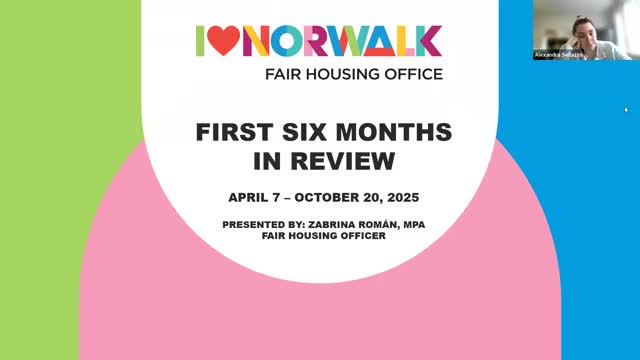Norwalk fair-housing officer reports 108 intakes in six months, plans expanded outreach and grant application
Get AI-powered insights, summaries, and transcripts
Subscribe
Summary
Fair Housing Officer Sabrina Roman told the Norwalk Fair Housing Advisory Commission the office handled 108 intakes and 63 confirmed fair-housing complaints since April 7, and outlined plans for expanded community education, a FY2026 grant application and a modest increase to the events budget.
Fair Housing Officer Sabrina Roman told the Norwalk Fair Housing Advisory Commission on Oct. 20 that the office has taken 108 intakes and confirmed 63 fair-housing complaints since she began on April 7, and she outlined plans to expand education and apply for a fiscal-year 2026 grant to support outreach work.
Roman said the office has shifted from predominantly reactive casework toward a mix of enforcement and prevention, telling commissioners that "the strongest fair housing office is one that informs before it enforces." She described upgrades to the office’s website and social-media presence, new digital intake and tracking templates, and partnerships with local housing providers and nonprofits.
The report to commissioners summarized the types of complaints the office has received, the services provided, and next steps. Roman said the most frequent complaint categories were source-of-income discrimination (including Section 8 voucher denials and cancelled inspections), disability accommodation requests (accessible units, parking, and service animals), retaliation or harassment after complaints, lease and billing issues affecting low-income tenants, and succession-rights questions for public housing following a tenant’s death or move-out.
Roman described specific case work the office handled: using HUD succession guidance to help a caregiver remain in a household unit, supporting multiple reasonable-accommodation requests, and coordinating a Commission on Human Rights and Opportunities (CHRO) filing and local supports for a tenant who reported harassment and retaliation by a landlord. "Behind every statistic is a person or a family," Roman said, and she said those cases have informed the office’s training and public materials.
On outreach and education, Roman recounted a Fair Housing Month webinar in April, trainings conducted for the Norwalk Fair Housing Authority and King’s Daughters and Sons Housing (an elderly housing provider), participation in the city’s affordable-housing event, and an upcoming landlord training organized with the Norwalk Housing Authority. She said the office relaunched its website to include the office history and the consent decree that created it, added a reasonable-accommodation letter generator, and published plain-language "know your rights" sheets for each protected class.
Roman reported early digital-engagement metrics: the office’s Instagram posts have reached roughly 1,600 views with about two-thirds of that engagement from non-followers, and LinkedIn posts have reached about 550 impressions. She said those channels are yielding visibility beyond Norwalk and helping connect landlords and tenants to accurate information.
Roman told commissioners she is preparing a FY2026 grant application to the Office of Management and Budget; the application had not been released at the time of the meeting, and Roman said she will circulate a draft to commissioners when it is available and seek their approval before submission. She said the grant plan will emphasize low-cost, high-impact strategies such as digital education, data-informed reporting, and cross-department partnerships to support both enforcement and prevention.
Commissioners discussed modest changes to next year’s events budget to move from one larger annual event to three smaller, focused outreach events. Roman said the office’s current events line is $1,500 and the proposal under discussion is to increase it to about $3,000; she said the increase would still represent a net decrease overall compared with the previous fiscal-year projection because last year’s budget had larger benefit projections. No formal vote on the proposed budget change was taken at the meeting.
Several commissioners offered public praise during the meeting. Commissioner Brenda Penn Williams said, "I want to applaud you for a job well done." Other commissioners noted that increased public awareness — especially through social media and city channels — has led more residents to report issues they previously thought were not reportable.
The commission approved the minutes from its Sept. 15 meeting by voice vote at the start of the session. The meeting concluded with a motion to adjourn, which commissioners approved by voice vote.
Roman said she will email the PowerPoint presentation to commissioners and welcomed suggestions for items the office should add to its outreach and training plan. Commissioners discussed holding a joint forum with local groups, including the NAACP and other community partners, to present the office’s work to a broader audience.
Votes at a glance: the commission approved acceptance of the Sept. 15 minutes by voice vote (ayes recorded) and later approved a motion to adjourn by voice vote (ayes recorded).
